Brigette Lundy-Paine on I Saw the TV Glow , Justice Smith, and Standing With Palestine

Zach Donovan
Brigette Lundy-Paine is tired of talking about identity. The 29-year-old actor, known for their work on the Netflix series Atypical, is tucked into a tiny nook with me at a coffee shop in Brooklyn and explains: “Everyone always wants to know and has so many questions. I'm like, what are you doing? Aren't you in a body? You understand that it's not about that. It's not about coding a third gender on an inpatient form. Don't you understand how complicated it is to be a person?” They are thoughtful and measured when talking about this, with only a tad of irritation in their voice.
We’ve spent the last hour together over cups of tea (rooibos for Lundy-Paine) talking ad nauseam about identity. They are starring in director Jane Schoenbrun’s second highly anticipated feature I Saw the TV Glow, out May 3, opposite Justice Smith. Lundy-Paine plays Maddy, a high school outcast, who introduces Owen (Smith) to a Buffy the Vampire-esque television show, The Pink Opaque. As they bond over the fictional series, the boundaries between their lives and the show begin to blur.
The film asks big, heady questions about identity in many different ways: What if our born gender isn’t the right one? What if the life we are living doesn’t feel the way we pictured it? Schoenbrun, known for the cult favorite We Are All Going to the World’s Fair, takes a big swing for their A24-backed second feature and proves they are a talent to watch. Lundy-Paine met Schoenbrun through producer Sam Intili, who at the time was a friend and now is Lundy-Paine’s partner. They met over Zoom and later hung out at Brooklyn’s Green-Wood Cemetery; the trio knew they wanted to work together on TV Glow. That was over a year before they shot the film and Lundy-Paine knew working on it would change their life: “TV Glow was like, this is what I'm going to do and this is going to explode my life. It has already exploded my life. Doing it exploded my life. Each time that I would be alone with the words of it for a year leading up to it, my life was exploding.”
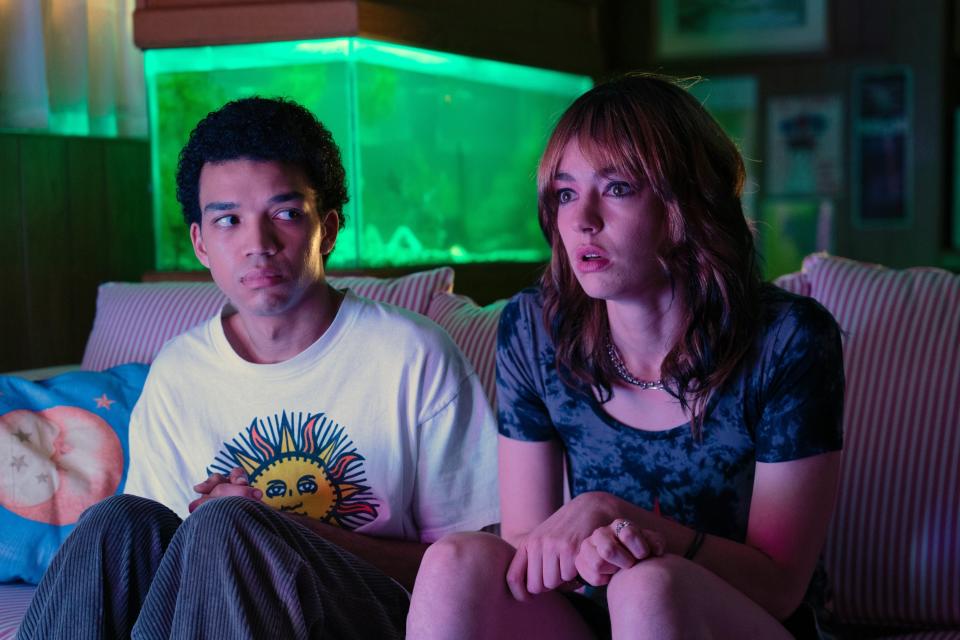
MCDIISA EC049
Lundy-Paine’s character Maddy is so enveloped in the world of The Pink Opaque that it allows her to disassociate from her own troubled life. For some, Maddy’s attachment to the show seems foreign, but for others that’s where they live. Lundy-Paine knew that TV Glow was going to be special, even before meeting Smith, who they now know is their Life Path Twin because they have almost the same birthday and share a Life Path number. With a cast boasting Danielle Deadwyler and Ian Foreman, Lundy-Paine mentions that Schoenbrun’s emphasis on taking their time during filming allowed their relationships to grow organically.
Without getting too into spoilers, Lundy-Paine delivers a monologue that operates as the crux of the film. With wild eyes and high cheekbones, it’s impossible to take your eyes off the actor. It’s truly a star-making moment and Lundy-Paine recognized the importance even before filming began: “I would be reciting the monologue constantly. Each time, it was a meditation; it was a prayer. Then each time we shot the scenes, I could feel the scattering of all our souls by making this permanent piece. It was honestly scary. I remember feeling so nervous that this was the only time we could do it, just asking Jane, are you sure this is right?”
So when they finally shot that pivotal scene, Lundy-Paine felt incredibly powerful. “When you meditate on poetry like that and you have the chance to share it, it's just with gratitude, and you're almost channeling this electricity of the rote practice that you are installing in your physical body."
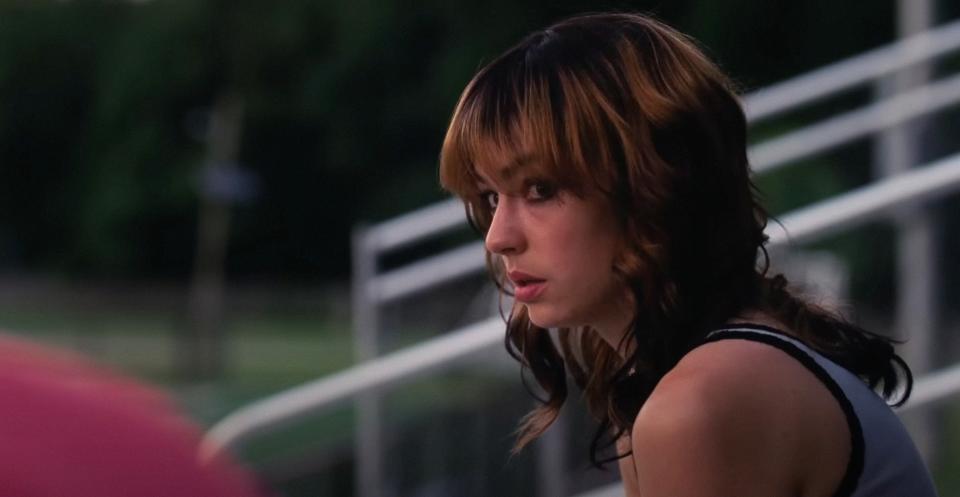
MCDISAW EC007
Courtesy Everett CollectionLundy-Paine gets really intense when talking about TV Glow. It’s apparent just how much the film means to them because they understand connecting with things as deeply as Maddy does. When I ask what their Pink Opaque was, they list several things: They loved SpongeBob Squarepants, Emily the Strange, and their “lifelong, crippling adoration” of Ariana Grande. They perk up when talking about their “crippling obsessions,” gesturing with their arms, wearing a big navy and gray striped sweater with a camouflage hoodie underneath.
Passion for the things Lundy-Paine loves is infectious and extends to projects outside of acting. They have a band, Subtle Pride, that helped inspire Waif Magazine, which they’ve been working on with close friends for about five or six years. They describe a bit about why Waif: “The earliest definition we found of waif is in this dictionary from 1887. It is tiny and says that waif means anything found without an owner. Waif is an unpropagandized sensibility.”
Waif has a mix of gorgeous, glossy photo spreads. One stars Liv Hewson styled in a variety of beards, plus quizzes, profiles, and even a eulogy for Dallas BBQ. They are planning on starting Waif TV and All Hounds, a fashion offshoot inspired by a houndstooth pattern because Waif is obsessed with that, as is Lundy-Paine, who shows me a houndstooth tattoo on their wrist. They’ve also created a sense of community with the magazine: Waifs across the country helped put together the upcoming 30th issue and they went on tour with the magazine meeting Waif fans across the US.
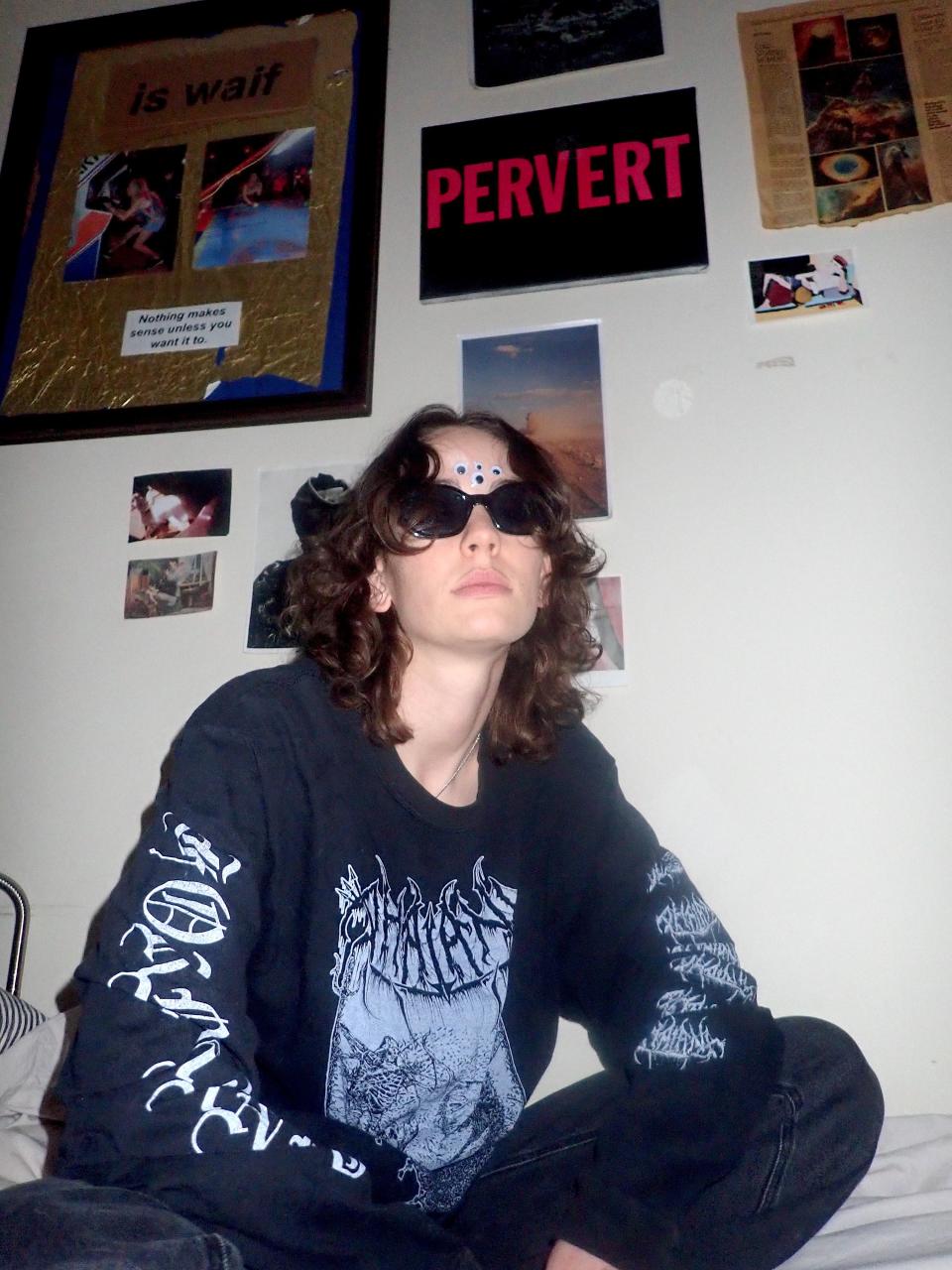
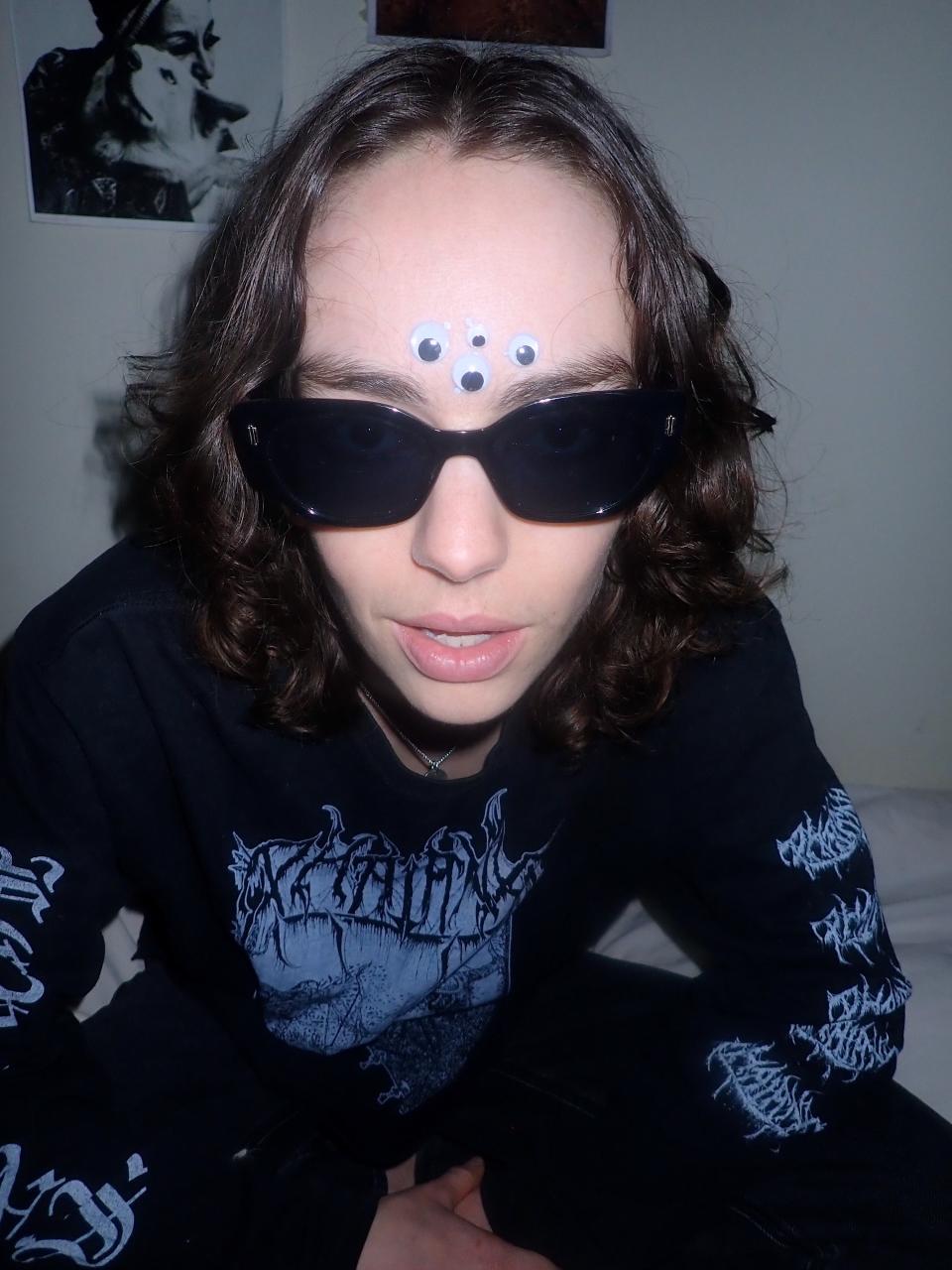
Lundy-Paine has created a sense of community throughout their career — fans of their character Casey on Atypical got to see Casey’s own coming out storyline parallel Lundy-Paine coming out as queer and then nonbinary using they/them pronouns. TV Glow is about the “egg crack” when a person first realizes they are trans, with Schoenbrun’s own lived experience as inspiration. The film tells a trans and queer narrative rarely seen in film and is expected to make an imprint on the queer community. Lundy-Paine has already been hearing from fans after TV Glow’s festival run. “The first response I heard directly from a young person and they were like, ‘I can't believe that this is public.’ They said that even the trailer was truth serum for them and their friend. It feels like even if you don't know that you're queer [when] watching it, something is activated in you, the seed of information that throughout your life will be ground into your identity.”
Being able to explore that with a largely queer, nonbinary, and trans group of people is the kind of stuff dreams are made of. But what the film explores, Lundy-Paine explains, isn't something new, it’s something that’s always been there. “The film feels important to me as it's a pulse of resistance in a long lineage of resistance art. It's not the end of anything. It's not the beginning of anything. It's just a reminder that we're not going anywhere.”
Lundy-Paine has carefully chosen their career to reflect their own politics, and starring in TV Glow, as they had previously mentioned, was going to blow up their life. We’ve really settled in by this point in our conversation and they seem more relaxed in opening up about how the movie has continued to unlock things for them. “I thought I was totally free. I did that crazy movie. I expressed this angst and terror of, Am I going to be able to change? And I've changed, but I'm still asking myself the same questions I was before, from the medicinal aspect to what it means to be trans to the social aspect to your energy every day.”
“When I was at Sundance," they continue, "and I did press there, it brought up another level of catharsis because I was really upset by what it felt like to do press for the movie, especially in the context of the genocide in Gaza and being at a film festival that is positioned as this liberal beacon of freedom and hope and it's branded by banks that are invested in weapons.” (Pro-Palestinian protestors also disrupted the festival.)
Lundy-Paine has always been outspoken about social justice. “In my physical and spiritual body, I do not feel clean unless I am speaking for those who cannot or speaking with the guttural cry of what it means to be alive on this earth. We can so easily turn away from that and we can so easily turn to numbness. I think that if you are not aligning yourself with liberation then you are robbing your bloodline.” Their voice gets noticeably louder as they continue, again gesturing with their hands, rings glinting on their fingers. “I think what it means to stand with Palestine on a smaller scale in your community is to be completely honest with the people around you and build a symbiotic relationship with each other that is all in the investment of a future we want to live in. And [if there’s] the fear of speaking out, that's baby sh*t. Get over it.”
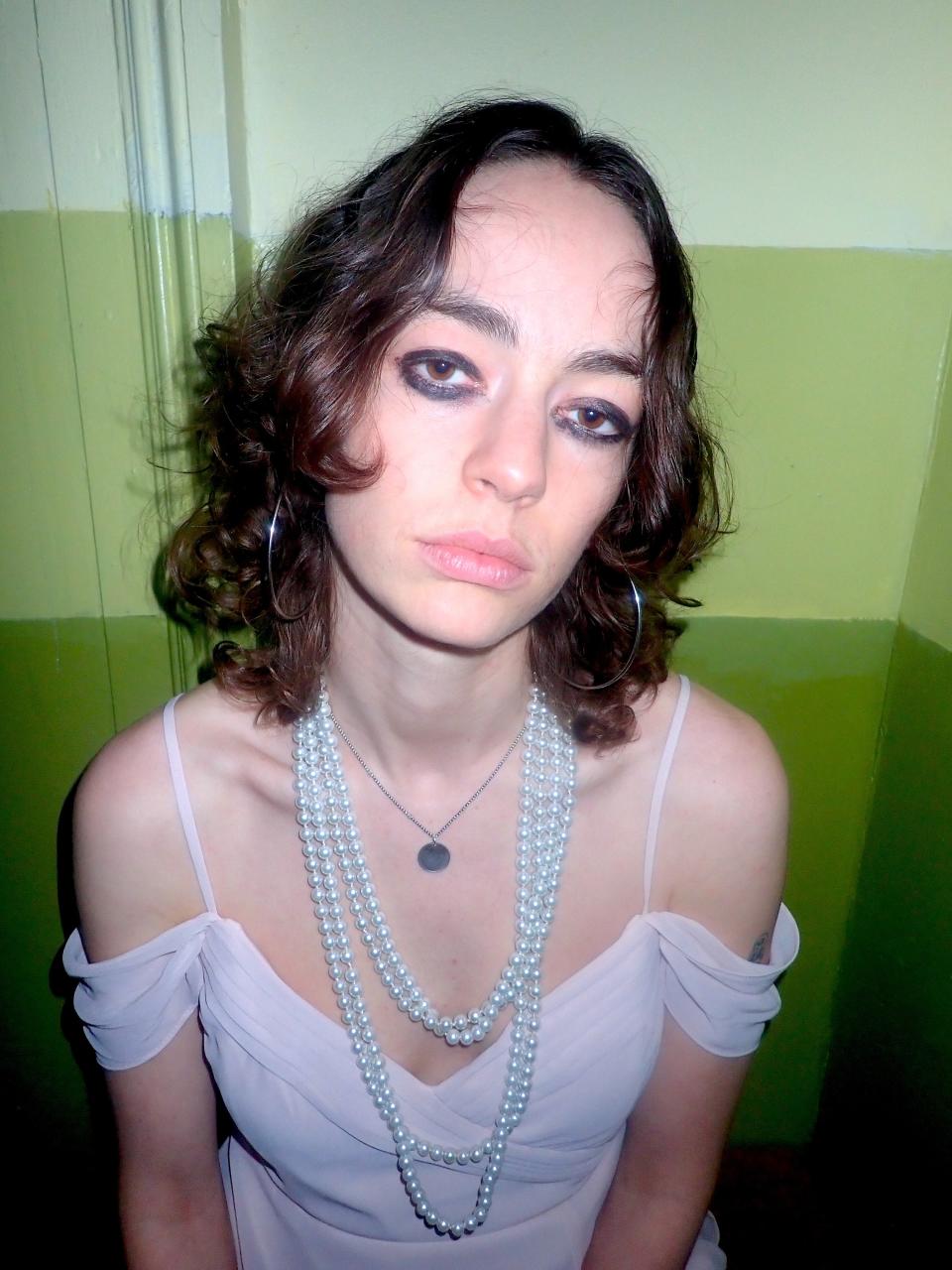
As Lundy-Paine is speaking so passionately, it's hard not to be mesmerized by the expression on their face, the power of their voice, and their striking features. It’s easy to see the gravitas they naturally brought to Maddy and their insistence on doing work that matters and brings people together.
We’re back to talking about identity again and they jokingly mimic a question, “How do you identify,” in their journalist's voice. They joke that they’ll do she/her pronouns to help sell their roommate’s clothes on Depop, and they vamp, pouting, pretending to put on their roommate’s “Brandy Melville cropped sweater.”
We’re giggling about their silly parody of gender, but that’s kinda what they’ve been saying all along, about being tired of talking about identity. They want the ability to morph, change, grow, and evolve — much in the way TV Glow allows its characters to attempt to do and asks of its audience. “I think doing TV Glow helped me to move past this obsession with explaining myself. What I felt for a long time was that I have to explain myself perfectly, which is impossible because there's no way to do it, even I don't understand.” Lundy-Paine continues, “I feel completely different day to day, hour to hour. I'm just a freak creature bird. I'm just crawling around. It's given me permission to stop explaining.”
Originally Appeared on Teen Vogue
Want more great Culture stories from Teen Vogue? Check these out:
A New Generation of Pretty Little Liars Takes on the Horrors of Being a Teenage Girl
Underneath Chappell Roan’s Hannah Montana Wig? A Pop Star for the Ages
Donald Glover’s Swarm Is Another Piece of Fandom Media That Dehumanizes Black Women
On Velma, Mindy Kaling, and Whether Brown Girls Can Ever Like Ourselves on TV
Gaten Matarazzo Talks Spoilers, Dustin Henderson, and Growing Up on Stranger Things
How K-pop Stars Are Leading Mental Health Conversations for AAPI People and Beyond
Meet the Collective of Philly TikTokers Making You Shake Your Hips
The Midnight Club Star Ruth Codd Isn’t Defined By Her Disability


